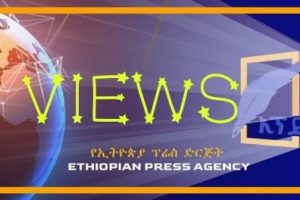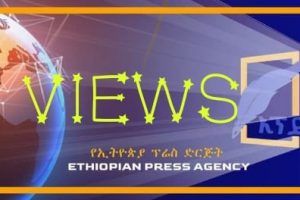The main factors causing insecurity and instability have to be identified and eliminated for advancing economic development. These factors may be internal or external threats that negatively affect the peace and security of Ethiopia. The internal threats include violent terrorism, extremism, ethnic violence and droughts that have always been serious challenges to the economic and social progress of the country. The external threats are related to the spill-over effects of several conflicts in the Horn of Africa region and neighboring States that have negatively impacted the country.
The threat of terrorist attacks within Ethiopia and on its economic interests remains persistent. Some neighboring countries engage in a proxy war by aligning with all sorts of enemies of Ethiopia. They host, train, and support armed groups and ethnic-based secessionist groups. As an extension of border wars, they supportradical religious and ethnic groups. However, their strategies are backfiring. These groups have been condemned for their terrorist attacks and have totally failed in their mission.
As M. Taddele and et al pointed it out, Ethiopia suffers from several internal conflicts at the local level due to a combination of historical, religious, cultural, political and economic factors. A major negative and perhaps “unintended” consequence of ethno-linguistic federalism is that it “aggravates” existing conflicts and leads to new ones. In some cases it has provoked and intensified existing traditional problems such as conflicts over grazing land and water. Conflicts may also arise if borders are based on rights and claims constructed on ethnic lines.
The second negative consequence of ethno-linguistic federalism, as pointed out by M. Taddele, has to do with “violations” of minorities’ rights and individual freedoms within ethnically based administrative units. However, the Federal arrangement has been effective in addressing most and in defusing some of the secessionist and irredentist movements. As a political instrument of shifting the axis of confrontation from insurgent group, federalism has been used as a “tool” of counter-insurgency. It is reported that intense and “relatively” successful government counter-insurgency campaign has exhausted the local rebellions, revolts and uprisings to bring insurgents back to the table in some regions, if not in all.
Ethiopia is considered as anchor country in the Horn because it has not only significantly improved its stability, registered promising economic development and built strong relations with neighboring countries, except a few. It has also become pivotal for regional peace and security. The fact that Ethiopia has transformed from being a source of regional instability and famine to a force for peace and integration is in itself a considerable “achievement.” After thousands of years as an independent African country, Ethiopia has a long diplomatic history and rich experience in foreign relations.
Its leaders were able to externalize almost all the country’s problems by focusing on, and building military defense capabilities against, the historical external enemies of Ethiopia. The main objective of the country was to address external threats and collaborate with regional and global actors for collective security. Domestically, the country focused on economic development, stability and democratic governance as its national priorities. Thus, the government employs regional diplomacy as a platform for solving regional challenges that are related to Ethiopia’s “internal” governance and development problems. The foreign policy strategy of the country is rightly and explicitly underscores that foreign policy is “subservient” to Ethiopia’s internal policies.
In terms of troop strength and equipment Ethiopia’s armed forces are ranked as one of the strongest in Africa. The military strength and role of the country in regional peace and security, including its excellent track record in peacekeeping, counter-terrorism and mediation, creates demands for its long-term partnerships and alliances in the region and beyond. It is one of the largest contributors of peacekeeping forces. It has one of the most effective fighting forces when it comes to being placed in some very difficult situations. Since the establishment of the UN, Ethiopia has successfully participated in several peacekeeping missions at the continental and global level, as one of the contributors of troops.
Ethiopia was one of the leading founders and main architects of the regional and international organizations. With this legacy sustained by an active participation, disciplined position and multilateral approach, Ethiopia has been able to exude confidence among its peers at the regional and global levels. It has been playing a “crucial” role in mediation and peace process at all levels. It has helped resolve local wars within countries and regional wars between countries. It has contributed to the resolution of civil wars and has brokered peace among African rebel groups.
Ethiopia remains the leader inmediation efforts in Africa. Peace agreements signed among warring faction within and between countries expressed the trust the country enjoys from all concerned parties. The presence of Ethiopia’s peacekeeping troops in hostile countries has confirmed the credibility of its partnership with the international community and the country’s continuing important role in efforts to resolve crises. The peace agreements also paved the way for the rapid deployment of peacekeeping forces in conflict regions. Ethiopia has signed comprehensive cooperation agreements with its neighboring countries.
As A. Abate pointed out, it has also signed bilateral agreements that include common defense and cooperation in countering terrorism and violent extremism. This agreement has been extremely significant and may end the hostile relations of the neighboring countries. Ethiopia has also signed several agreements on economic, social and cultural issues with these countries. More importantly, it has established joint defense committees and signed a mutual legal aid and extradition agreements. The defense and security cooperation agreements are so strong that some other countries perceive them as “threat.” In addition to strong collaboration on fighting terrorism in the region, it has established joint commissions.
Ethiopia’s central location has allowed it to become a hub of regional integration. It is now a leading country in supporting integrative infrastructural developments, particularly hydroelectric power. Aiming to expand the current hydropower production, ithas invested extensively in the power sector. In its infrastructure development initiative, it intends to build roads and railways and expand ports in cooperation with African countries. As a landlocked country, these initiatives will facilitate its imports, exports and related services. There is a strong economic interdependence between Ethiopia and its neighbors that need the products and services of each other in an integrated manner.
Due to economic interdependence, neighboring countries depend on Ethiopia for some fresh food, electricity and water supplies. According to WB report, it has exported electricity to its neighbors.Trade volume between the country and the neighboring countries has been on the rise. Ethiopian trade with these countries has sometimes been small and informal, involving cross-border trade as noted by AfDB. In a bid to enhance regional trade, plans exist to construct rail links between Ethiopian cities and extending to cities of neighboring countries. These integrative efforts and opportunities may in the long-run contribute to peace dividend through the creation of a middle class and economic interdependence among countries.
Over the past decade, Ethiopia has registered remarkable economic achievement by any measure. Several future studies on the Ethiopian economy forecast annual GDP growths over the coming years, assuming that peace and political stability will reign. The adoption of pro-poor policies in agriculture, rural road infrastructure, health and education would lead to notable improvements in the livelihood of the poor people. Huge domestic investment in a series of massive dam projects will increase the country’s hydroelectric power capacity. At the same time, the population of Ethiopia is expected to exceed 135 million in the next decade, with increase in “urbanized” population.
A large proportion of the population will be at a relatively young age. The Ethiopian youth will be connected through mobile telephones and the Internet, adding millions to the more technologically “conversant” and connected generations. These advancements could be accelerators of development as they could also resist repression by hostile forces that hamper the progress of the country. Demographic analyses have pointed out that with the positive trends there are also negative developments. With highly connected, conversant, mobile and vocal “unemployed” young people, unrest may increase unless attended properly.
The shortage of basic necessities has also magnified the problems of the youth. As indicated by M. Taddele and A. Abate, scarcity and deficiency of fresh water, gaps between supply and demand for energy and electricity, and income gaps may contribute to social unrest and increase the “vulnerability” of communities to extremist ideologies, international crime and transnational threats. While violence could be increasingly localized, its impact will be global with transnational implications such as organized crime and displacement of populations. The main question is, therefore, whether economic reform outpaces crisis or not.
Peace, security and poverty reduction are absolutely necessary for economic progress in Ethiopia. Given that extreme poverty will remain the most formidable socioeconomic, governance and security challenge, the international community should strengthen its support for the developmental efforts of Ethiopia. The country has developed the necessary normative, institutional and collaborative framework for poverty eradication and development. Its predictive, preventive, responsive and adaptive capacity is certainly a function of resilience to vulnerabilities to internal and external shocks.
Ethiopia would also contribute to strengthening sustainable peace and security. To assist the country in this endeavor, concerned partners need to design a creative strategy on service delivery and on democratic governance. There is a need to expand democratic space with enhanced capacity of the government to do so. There is also a need to prevent election-related violence through identifying and assisting the“drivers” of democratizationin thecountry. Violence is a threat to the peaceful democratic process that the Ethiopian government is trying to maintain for economic progress that reduces the poverty of people.
Editor’s Note: The views entertained in this article do not necessarily reflect the stance of The Ethiopian Herald
BY GETACHEW MINAS
THE ETHIOPIAN HERALD MAY 28/2021




